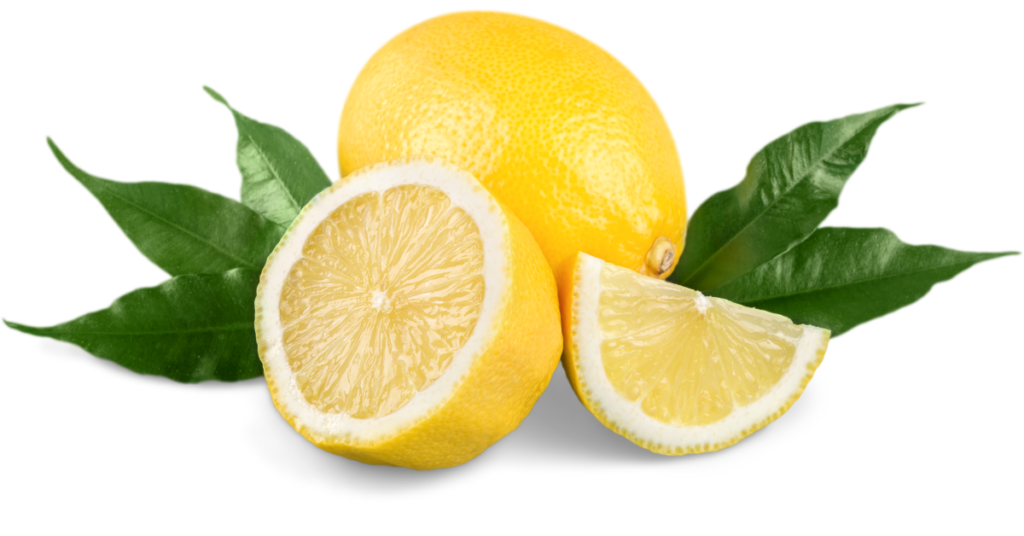Lemon – Essential Oil
Lemon (Citrus limonum)
Lemons have been used in cooking for centuries. Pregnant women in Roman times used to drink a glass of lemon juice to relieve nausea. In fact, lemon has the ability to reduce temperatures, which is why it is beneficial to use if you have a cold or the flu. Citrus oils go off more quickly than other essential oils and, for this reason, they should be used up quickly.
Other uses include:
Cuts
Circulation
Skin problems
Colds
Warts
Verrucas
Sluggishness
Cautions
Do not use on babies or children under the age of 5 years.
This oil can irritate the skin so the following dilutions have allowed for this.
Cuts
Lemon is a great bactericide and will kill both diphtheria and tuberculosis bacilli even when diluted to 0.2%, making it a very good oil to use when cleaning cuts and scrapes.
Directions for use
Rinse: Add 1 drop of pure essential oil to 1½ litres of warm water and rinse wound with solution.
Circulation
Lemon is a stimulating oil and has a toning effect on the body. It is a good oil to use in a massage blend if you have varicose veins, but do not massage over the veins themselves, and always massage towards the heart area.
Directions for use
Massage: Mix 20 ml of carrier oil (sweet almond, grape seed) to 2 drops of pure essential oil.
Skin problems
The astringent properties of lemon oil make it great to use on boils and oily skin, but it can irritate skin.
Directions for use
Compress: Add 1 drop of pure essential oil to 1½ litres of warm water. Lay sterile material on the surface of the water thus attracting a film of oil onto the cloth. Apply the material onto the affected area and leave for 10 minutes. Repeat daily.
Facial Massage: Mix 20 ml of carrier oil (sweet almond, grape seed) to 1 drop of pure essential oil, and rub into face.
Inhalation: Boil 1 litre of water and pour into a bowl, add up to 3 drops of pure essential oil, place a towel over your head, and allow steam to rise onto face. Do not do if the skin is very sore as the steam may ‘burn’ already painful skin.
Colds
Lemon has the ability to reduce temperatures, which is why it is beneficial to use if you have a cold or the flu. Lemon juice should be drunk with hot water. Do not take lemon oil internally, but do use the oil in the following ways.
Directions for use
Inhalation: Boil 1 litre of water and pour into a bowl, add up to 3 drops of pure essential oil, place a towel over your head, and allow steam to rise onto face. Do not do if the skin is very sore as the steam may ‘burn’ already painful skin.
Bath: Add up to 2 drops of pure essential oil to a bath of water, and lie back and relax.
Handkerchief: Put a couple of drops of pure essential oil onto a tissue or handkerchief and inhale as and when required.
Oil burner:. Sprinkle up to 3 drops of pure essential oil onto water and light the burner.
Warts
Directions for use
Treatment: Add 2 drops of oil to 10 drops of cider vinegar and apply daily to the warts making sure you avoid the surrounding skin. Cover with a plaster but leave uncovered at night. Continue the treatment until the condition has cleared. You can add or alternate with Tea tree oil if you wish.
Verrucas
Directions for use
Treatment: Add 2 drops of oil to 10 drops of cider vinegar and apply daily to the varrucas making sure you avoid the surrounding skin. Cover with a plaster but leave uncovered at night. Continue the treatment until the condition has cleared. You can add or alternate with Tea tree oil if you wish.
Sluggishness
If you have had a hard day, have overindulged, or simply need a boost, lemon oil will give you the lift you need.
Directions for use
Inhalation: Boil 1 litre of water and pour into a bowl, add up to 3 drops of pure essential oil, place a towel over your head, and allow steam to rise onto face. Do not do if the skin is very sore as the steam may ‘burn’ already painful skin.
Bath: Add up to 2 drops of pure essential oil to a bath of water, and lie back and relax.
Handkerchief: Put a couple of drops of pure essential oil onto a tissue or handkerchief and inhale as and when required.
Oil burners: Sprinkle up to 3 drops of pure essential oil onto water and light the burner.
Further information
Where grown: The lemon tree is native to Asia, but is grown all around Europe, especially in the Mediterranean area. The tree belongs to the Rutaceae family.
Parts used and method of extraction: Rind and skin of the lemon fruit obtained by expression. It takes 3,000 lemons to produce 1 kilogram of oil.
Colour and smell: The oil is pale green / yellow, and smells exactly the same as the fruit; fresh and light.
Active ingredients: Pinene, limonene, phellandrene, camphene, linalool, acetates of linalool, geranyl, citral, citronellal.
Properties: Haemostatic, astringent, bactericide.
Mixes well with: Geranium, other citrus oils, ginger.

